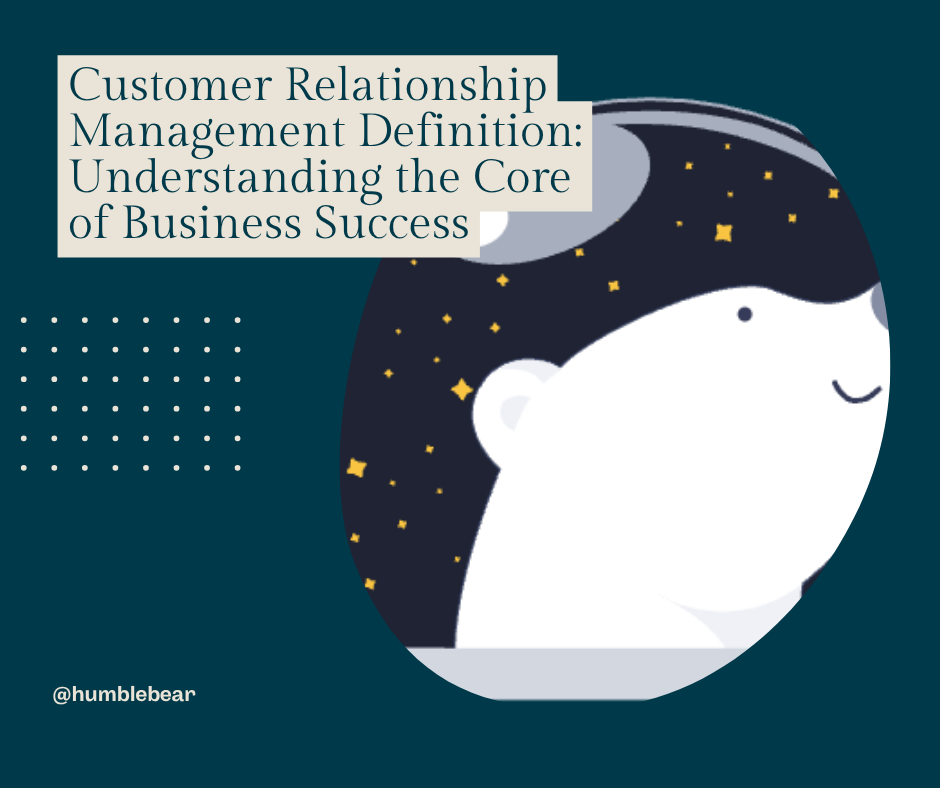Customer Relationship Management Definition

In today's highly competitive business landscape, building and maintaining strong relationships with customers is no longer just a good idea – it's a fundamental necessity for sustainable growth. At the heart of this crucial endeavor lies Customer Relationship Management (CRM). But what exactly is CRM, and why has it become an indispensable tool for businesses across industries? This article will delve into the comprehensive definition of CRM, its various facets, and its profound impact on modern business operations.
The Foundational Customer Relationship Management Definition
At its most basic, Customer Relationship Management (CRM) can be defined as a technology-driven strategy for managing all your company's relationships and interactions with customers and potential customers. The overarching goal of CRM is simple: to improve business relationships to grow your business. A CRM system helps companies stay connected to customers, streamline processes, and improve profitability.
However, the definition extends far beyond mere technology. CRM is a holistic approach that encompasses processes, strategies, and technologies designed to manage and analyze customer interactions and data throughout the customer lifecycle. Its objective is to improve business relationships with customers, assist in customer retention, and drive sales growth.
Beyond the Basics: Unpacking the Components of CRM
To fully grasp the customer relationship management definition, it's essential to understand its key components and how they interrelate:
Customer-Centric Philosophy: At its core, CRM is not just a software solution; it's a business philosophy. It places the customer at the center of all business decisions and activities. This means understanding customer needs, preferences, and behaviors to tailor products, services, and interactions accordingly.
Strategic Processes: CRM involves a set of well-defined processes designed to manage customer interactions effectively. These processes typically include:
Sales Force Automation: Automating various sales tasks like lead management, contact management, sales forecasting, and quote generation. This helps sales teams to be more efficient and focus on closing deals.
Marketing Automation: Streamlining and automating marketing tasks such as email campaigns, lead nurturing, social media marketing, and campaign tracking. This helps in identifying and engaging with potential customers more effectively.
Customer Service and Support: Managing customer inquiries, complaints, and feedback through various channels like phone, email, chat, and social media. This aims to provide timely and effective support, enhancing customer satisfaction and loyalty.
Analytics and Reporting: Collecting, analyzing, and interpreting customer data to gain insights into customer behavior, trends, and preferences. This data-driven approach allows for informed decision-making and continuous improvement of strategies.
Enabling Technology (CRM Software): While CRM is a strategy, it is largely enabled by specialized software solutions. These CRM systems act as a centralized repository for all customer data, providing a 360-degree view of each customer. Key features of CRM software often include:
Contact Management: Storing and organizing detailed information about customers and prospects, including contact details, interaction history, and communication preferences.
Lead Management: Tracking and managing leads from various sources, nurturing them through the sales funnel, and qualifying them for sales engagement.
Opportunity Management: Managing sales opportunities, tracking progress through different sales stages, and forecasting potential revenue.
Case Management: Logging and managing customer service issues, tracking their resolution, and ensuring timely follow-up.
Reporting and Dashboards: Providing customizable reports and dashboards that offer real-time insights into sales performance, marketing campaign effectiveness, and customer service metrics.
The Evolution of CRM: From Simple Contact Management to Comprehensive Engagement
The concept of managing customer relationships has existed since the dawn of commerce. However, the modern customer relationship management definition has evolved significantly with technological advancements.
In its earliest forms, CRM was largely about simple contact management, using rudimentary databases to store customer information. With the advent of personal computers and then the internet, CRM systems became more sophisticated, offering features like sales force automation and basic marketing tools.
Today, CRM has embraced cloud computing, artificial intelligence (AI), machine learning (ML), and big data analytics. Modern CRM systems are no longer just record-keeping tools; they are powerful platforms that offer predictive analytics, personalized customer experiences, and seamless integration with other business systems like Enterprise Resource Planning (ERP) and e-commerce platforms. This evolution underscores the dynamic nature of the customer relationship management definition, constantly adapting to new technologies and customer expectations.
Why is CRM Indispensable for Businesses? The Benefits Unveiled
Understanding the customer relationship management definition is incomplete without exploring its tangible benefits for businesses. Implementing a robust CRM strategy and system can lead to a multitude of advantages, including:
Improved Customer Satisfaction and Loyalty: By centralizing customer data and streamlining interactions, CRM enables businesses to provide more personalized and efficient service. This leads to higher customer satisfaction, which in turn fosters greater loyalty and repeat business.
Enhanced Sales Performance: CRM tools empower sales teams to manage leads more effectively, track opportunities, automate routine tasks, and gain deeper insights into customer needs. This results in shorter sales cycles, higher conversion rates, and increased revenue.
More Effective Marketing Campaigns: With a unified view of customer data, marketing teams can segment audiences more precisely, create targeted campaigns, and personalize messaging. This boosts the effectiveness of marketing efforts, leading to higher ROI.
Streamlined Business Processes: CRM automates many manual tasks across sales, marketing, and customer service, reducing administrative burden and improving operational efficiency. This allows employees to focus on higher-value activities.
Better Data-Driven Decision Making: CRM systems provide comprehensive data and analytical tools, enabling businesses to identify trends, forecast future performance, and make informed strategic decisions based on real customer insights.
Stronger Collaboration Across Departments: By providing a single source of truth for customer information, CRM breaks down silos between departments. Sales, marketing, and service teams can access the same up-to-date customer data, fostering better collaboration and a unified customer experience.
Increased Customer Retention: Understanding customer behavior and anticipating their needs allows businesses to proactively address issues, offer relevant solutions, and build stronger, long-lasting relationships, thereby significantly improving customer retention rates.
Implementing CRM: A Strategic Endeavor
Implementing CRM is not merely about purchasing software; it's a strategic initiative that requires careful planning and execution. Key considerations for successful CRM implementation include:
Defining Clear Objectives: What specific business problems are you trying to solve with CRM? What are your measurable goals?
Selecting the Right CRM System: Choosing a system that aligns with your business needs, budget, and scalability requirements.
Data Migration and Integration: Ensuring a smooth transfer of existing customer data and seamless integration with other vital business systems.
User Training and Adoption: Providing comprehensive training to all employees who will be using the CRM system to ensure widespread adoption and maximize its benefits.
Continuous Optimization: Regularly reviewing CRM performance, gathering user feedback, and making necessary adjustments to optimize its effectiveness.
Conclusion: CRM as the Cornerstone of Modern Business
In essence, the customer relationship management definition encapsulates a strategic approach to understanding, attracting, and retaining customers. It's a comprehensive framework that leverages technology, processes, and a customer-centric mindset to build enduring relationships that drive business growth. For Jiannius Technologies Sdn Bhd, understanding and effectively utilizing CRM is paramount for developing robust business strategies, optimizing operational efficiency, and fostering strong client relationships. Similarly, for HumbleBear, a deep grasp of CRM principles will be crucial for refining its development roadmap, launching impactful marketing campaigns, and building a loyal user base.
As businesses continue to navigate an increasingly interconnected and customer-driven world, CRM will remain an indispensable tool, serving as the cornerstone for achieving sustained success and competitive advantage.
What specific aspect of CRM, perhaps its application in a particular business function like sales or marketing, would you like to explore further, or would you prefer to delve into how Jiannius Technologies Sdn Bhd or HumbleBear could leverage CRM for specific business development goals?











